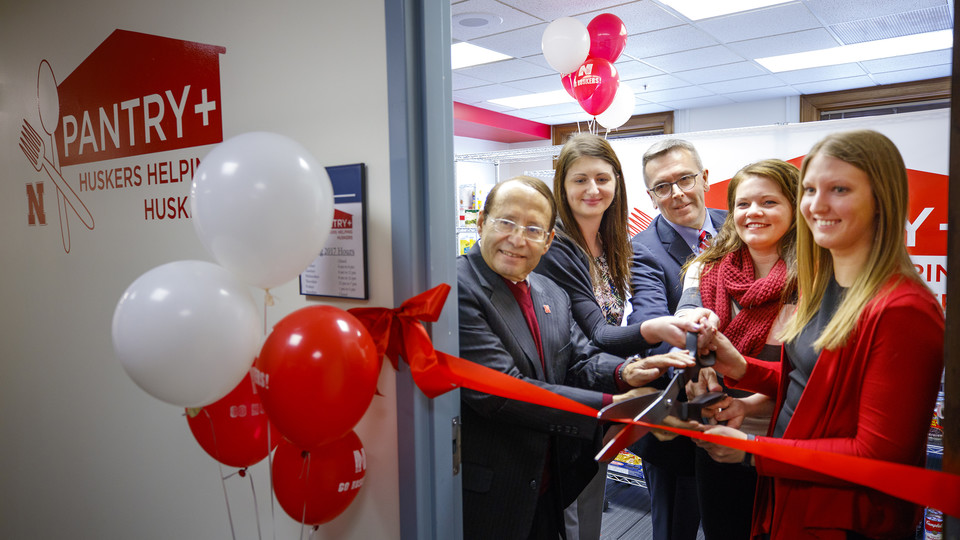
Now a vital resource for 80 students a week, Huskers Helping Huskers Pantry+ was established after university leaders uncovered a surprising statistic: one in three Nebraska students regularly worry about not having enough food to eat.
The numbers originated from a student finances survey conducted in December 2015. Among other revelations, it also found that only 38 percent of students in 2014 could always afford to eat nutritious meals and 2 percent did not have a place to live during school breaks.
Juan Franco, then vice chancellor of student affairs, knew that these survey results necessitated action. So, one year later, he opened Huskers Helping Huskers Pantry+ in January 2017 with the assistance of Student Money Management Center program coordinator Megan Patel.
“It was really his idea,” Patel said of Franco, who passed away in August 2017. “There are many community resources available to those in need, but since we have such a large population of students that need help, we realized that it’s important that the university directly provides those services.”

Located in the Nebraska Union, Room 348, the pantry serves as a convenient, fast way for students to stock up on basic necessities — whether that’s deodorant, a can of soup, or diapers for young ones. Those struggling with finding a place to live can also speak to Patel, a certified accredited financial counselor, about shelter resources.
The only requirement for using the pantry is an NCard and current enrollment in at least one credit hour. No low-income designation needs to be met, and Patel says it’s important to understand the countless reasons why a student may need to visit.
“Unexpected things pop up, whether that’s a medical issue or a hospital bill. If your money goes towards those expenses, even if you were fine before, you’re suddenly in a situation where you can’t afford food,” Patel said. “Others support families or are paying off a debt. For many students, there’s no option to reach out to family or fall back on them for financial assistance. We have a lot of students who are in that situation or don’t feel comfortable burdening their parents with their issues.”

As program coordinator, Patel leads a team of 20 volunteers who help keep the pantry operating. Sophomore Karin Ellefson, an advertising and public relations major from Chanhassen, Minnesota, is one of them. She spends two hours a week welcoming and checking in students, keeping track of inventory, and helping stock and sort incoming donations.
Many of the students Ellefson assists are regulars who visit once a week. She says that her role is to help, not judge.
“We don’t want it to feel like a pantry. We want it to feel more like a store experience, and we want the students to feel comfortable,” she said. “We never send anyone away. We don’t care what your situation is. You can come in here no matter what you’re going through.”
The number of students using Huskers Helping Huskers Pantry+ has increased significantly since its opening, from an average of 16.59 visiting per week in spring 2017 to an average of 78 per week in September 2018. But with this growth comes challenges. As of September, an average of 19 items is taken per visit, and this high volume of need means that the pantry can struggle to keep products on the shelves.

“Think about going to get groceries for your family. You don’t just buy 19 items,” Patel said. “These students are only taking what they need. Our goal is to keep the shelves stocked enough so that when a student comes in and needs a specific item, we have it.”
True to its name, Huskers Helping Huskers Pantry+ has benefited from the support of many university organizations. To celebrate these partnerships, it will host the following upcoming events as a part of November’s Hunger and Homelessness Awareness Week:
- Nov. 12: Pantry open house, 8 to 10 a.m. — snacks provided
- Nov. 13: Games and prizes in the Nebraska Union, noon to 1 p.m.
- Nov. 14: Social media prize opportunity — follow the pantry’s Twitter and Facebook pages for more information
- Nov. 15: “Penny Wars” donation competition between Greek houses
- Nov. 16: Donations from campus bins collected and counted, winner to be announced
- Weeklong event: Huskertech promotion — donate an item and receive a $5 discount on a phone activation fee
The pantry’s most-needed food items include granola bars, crackers, ramen, fresh vegetables and soup. Hygiene items such as toothbrushes, toilet paper and deodorant can also be donated. A full list of possible donations, locations of donation bins on campus and volunteer opportunities can be found on the pantry website.
Patel is grateful for the community support the pantry has received over the past two years. Each donation, she says, has a bigger impact than anyone may realize.
“It’s so fulfilling to watch people get the basic necessities they need,” she said. “Seeing how grateful they are makes your whole day.”







